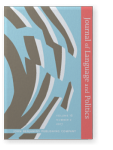Uzbek re-modeled
Russian loanwords in post-soviet Uzbek media
This study investigates the relationship between Russian language use and language planning in the context of newly independent, post-soviet Uzbekistan (1991–1992). It is guided by the question: In what ways does the use of Russian loanwords in Uzbek language newspapers accomplish language planning in newly independent Uzbekistan? The main finding from this analysis is that post-independence use of Russian loanwords from particular semantic classes in particular contexts reinforce overtly stated ideologies about Russian and construct difference between soviet Uzbekistan and independent Uzbekistan. These findings demonstrate the need to reexamine the role of Russian language in post-soviet contexts, and they contribute a unique approach to analyzing links between lexical items and ideology in language planning.
Article outline
- 1.Introduction
- 2.Language planning
- 3.The Uzbek context
- 4.The current study
- 4.1Counting and classification
- 4.2Context
- 5.Results and discussion
- 5.1Results and discussion part I: Language ideologies
- 5.2Results and discussion part II
- 5.2.1Decrease in use of Russian loanwords
- 5.2.2Maintenance of Russian loanwords
- 5.2.3Restricted use for Russian loanwords
- 6.Conclusion
- Acknowledgements
- Notes
-
References
This article is currently available as a sample article.
References (34)
Akiner, Shirin
1997 “
Survey of the Lexical Influence of Russian on Modern Uzbek (1870 1990).”
The Slavonic and East European Review, 75(1): 1–35.

Androunas, Elena
1993 Soviet Media in Transition: Structural and Economic Alternatives. Westport, CT: Praeger Publishers.

Anthony, Laurence
2014 AntConc (Version 3.4.3) [Computer Software]. Tokyo, Japan: Waseda University. Available from
[URL]
Bauman, Richard
1992 “
Contextualization, Tradition, and the Dialogue of Genres: Icelandic Legends of the Kraftaskald.” In
Rethinking Context: Language as an Interactive Phenomenon, ed. by
Alessandro Duranti, and
Charles Goodwin, 125–146. New York, NY / Oakleigh, Melbourne: Cambridge University Press.

Boeschoten, Hendrik
1998 “
Uzbek” In
The Turkic Languages, ed. by
Lars Johanson, and
Éva Csató, 357–378. London / New York: Taylor & Francis.

Brown, Jeff
1995 “
Mass Media in Transition in Central Asia.”
International Communication Gazette, 54(3): 249–265.


De Cillia, Rudolf, Martin Reisigl and Ruth Wodak
1999 “
The Discursive Construction of National Identities.”
Discourse & Society, 10(2): 149–173.


Fierman, William
1982 “
The Shifting Russian and Uzbek Language Balance in pre-World War II Uzbekistan.”
International Journal of the Sociology of Language, (38): 125–125.

Fierman, William
1989 “
Glasnost in Practice: The Uzbek Experience.”
Central Asian Survey, 8(2): 1–45.


Fierman, William
1991 Language Planning and National Development: The Uzbek Experience. Berlin / New York: Mouton de Gruyter.


Fierman, William
1995 Problems of Language Law Implementation in Uzbekistan.
Nationalities Papers, 23(3): 573–595.


Fishman, Joshua
2000 “
The Status Agenda in Corpus Planning.” In
Language Policy and Pedagogy: Essays in Honor of A. Ronald Walton, ed. by
Richard Labert, and
Elena Shohamy, 43–51. Amsterdam: John Benjamins Publishing Company.


Fishman, Joshua
2004 “
Ethnicity and Supra-ethnicity in Corpus Planning: The Hidden Status Agenda in Corpus Planning.”
Nations and Nationalism 10(1–2): 79–94.


Hornberger, Nancy
1997 “
Language Planning from the Bottom Up.” In
Indigenous Literacies in the Americas: Language Planning from the Bottom Up, ed. by
Nancy Hornberger, 357–366. Berlin: Walter de Gruyter.


Irvine, Judith and Susan Gal
2000 “
Language Ideology and Linguistic Differentiation.” In
Regimes of Language: Ideologies, Polities, & Identities, ed. by
Paul V. Kroskrity, 35–84. Santa Fe, NM: School of American Research Press.

Johnson, David
2013 Language Policy. Berlin: Palgrave Macmillan.


Kaplan, Robert and Richard Baldauf Jr.
1997 Language Planning from Practice to Theory. Clevedon: Multilingual Matters Ltd.

Kari-Nyazov, Tashmuxamed
1955 Studies in the History and Culture of Soviet Uzbekistan. [
Очерки истории культуры Советского Узбекистана.] Moscow: Nauk and Tashkent University Press.

Khalid, Adeeb
2007 Islam after Communism. Berkeley / Los Angeles: University of California Press.

Kloss, Heinz
1969 Research Possibilities on Group Bilingualism: A Report. Quebec: International Center for Research on Bilingualism.

Kreindler, Isabelle
1997 “
Multilingualism in the Successor States of the Soviet Union.”
Annual Review of Applied Linguistics, 171: 91–112.


Landau, Jacob and Barbara Kellner-Heinkele
2001 Politics of Language in the ex-Soviet Muslim States: Azerbayjan, Uzbekistan, Kazakhstan, Kyrgyzstan, Turkmenistan, and Tajikistan. Ann Arbor, MI: University of Michigan Press.

Levi, Scott
2007 Turks and Tajiks in Central Asian History.
Everyday Life in Central Asia: Past and Present, ed. by
Jeff Sahadeo, and
Russell Zanca, 13–31. Bloomington, IN: Indiana University Press.

Marashi, Mehdi
1988 “
Phonetic and Semantic Modification of Farsi Loanwords in Contemporary Uzbek.”
Islamic Culture 62(2–3), 79–96.

McNair, Brian
1991 Glasnost, Perestroika and the Soviet Media. Milton Park, Abingdon, Oxon: Routledge.

Myers‐Scotton, Carol
1992 “
Comparing Codeswitching and Borrowing.”
Journal of Multilingual and Multicultural Development, 13:(1–2), 19–39.


Pavlenko, Aneta
2008 “
Russian in post-Soviet Countries.”
Russian Linguistics 32(1): 59–80.


Roy, Olivier
2000 The New Central Asia: The Creation of Nations. New York: I.B. Tauris Publishers.

Schiffman, Harold
1998 Linguistic Culture and Language Policy. London: Routledge.

Schlyter, Birgit
2012 Language policy and Language Development in Multilingual Uzbekistan. In
Language Policy and Language Conflict in Afghanistan and Its Neighbors: The Changing Politics of Language Choice, ed. by
H. Schiffman, 176–207. Leiden / Boston: Brill.


Silverstein, Michael
1993 Metapragmatic discourse and metapragmatic function.
Reflexive language: Reported speech and metapragmatics, ed. by
John Lucy, 33–58. Cambridge: Cambridge University Press.


Cited by (2)
Cited by 2 other publications
Place, Joseph & Judas Everett
2024.
Ukraine, language policies and liberalism: a mixed second act.
Studies in East European Thought 
Catedral, Lydia
2021.
The (im)possibility of sociolinguistic hybridity: Power and scaling in post‐soviet, transnational life.
Journal of Sociolinguistics 25:3
► pp. 324 ff.

This list is based on CrossRef data as of 5 july 2024. Please note that it may not be complete. Sources presented here have been supplied by the respective publishers.
Any errors therein should be reported to them.
